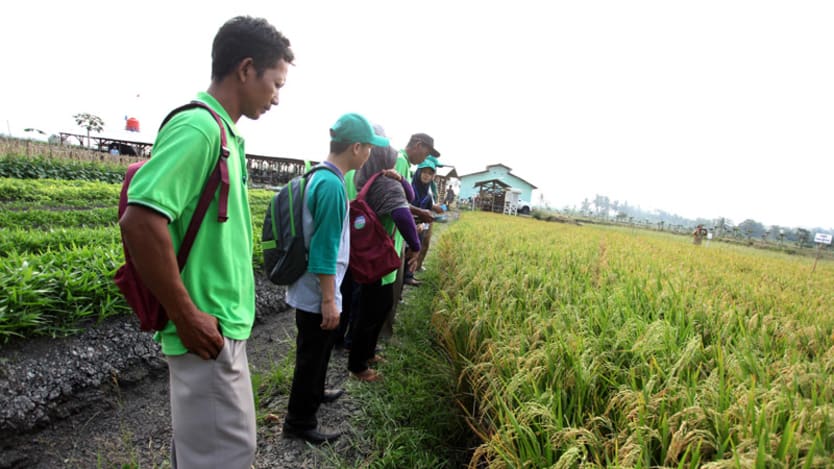
This year has witnessed major new agreements that will guide global action in the coming years on disaster risk reduction and sustainable development. Now, all eyes turn to Paris for the final, pivotal negotiations on climate change.
Decisions made at the Paris climate change conference — or COP21 — will determine whether humanity still has a chance of keeping temperature increases to less than 2 degrees Celsius by the end of the century. Without bold and dramatic action, we are exposing our children, grandchildren and subsequent generations to a much more dangerous and hostile future.
The record high concentrations of carbon dioxide — which can remain in the atmosphere for hundreds of years — have already committed the planet to continued warming. In contrast to the emerging climate change agreement, the laws of physics are non-negotiable. The impacts of climate change are already evident — melting ice, rising sea levels, more extreme weather and rising temperatures.
More than ever before, we need tools and knowledge to help us cope with — and adapt to — both long-term climate change and shorter-term natural variability.
GFCS partners include:
The European Commission, the European Organization for the Exploitation of Meteorological Satellites, the U.N. Food and Agriculture Organization, the Global Water Partnership, the International Federation of Red Cross/Red Crescent Societies, the International Union of Geodesy and Geophysics, the U.N. Development Program, the U.N. Environment Program, the Norwegian Refugee Council, the U.N. Office for Disaster Risk Reduction, the U.N. Institute for Training and Research, the World Bank, the World Business Council for Sustainable Development, the World Food Program, and the World Health Organization.
The Global Framework for Climate Services is helping to provide such tools and knowledge. Climate services provide science-based and user-specific information for managing the risks and exploiting the opportunities created by climate variability and climate change. They assist policymakers and decision-makers responsible for a wide range of climate-sensitive sectors to take practical actions based on the best available climate and other relevant scientific and socio-economic research and information.
In this way, climate services can help society to become more resilient and to cope with the growing impacts of climate change.
For example, the provision of more and better climate services will allow farmers to fine-tune their planting and marketing strategies based on seasonal climate forecasts; empower disaster risk managers to prepare more effectively for droughts and heavy precipitation; assist public health services to target vaccine and other prevention campaigns to limit climate-related disease outbreaks such as malaria and meningitis; and help improve the management of water resources. These activities all contribute to appropriate adaptation planning to a changing climate.
The GFCS offers a platform for expanding, improving and coordinating the delivery and use of climate services for decision-making. Spearheaded by the World Meteorological Organization, the GFCS embraces a broad partnership of United Nations and other international organizations with diverse and crosscutting mandates.
The challenges in rolling out climate services are huge, especially in least developed countries. But the progress and potential is impressive.
Following on from progress in the range and accuracy of short-term weather forecasts, seasonal and multiyear climate forecasting has advanced to the point where it can now provide actionable information. Growing confidence in climate forecasts has been made possible by supercomputer-based modeling, improved observations from satellites and other instruments and a greater understanding of large-scale climate patterns such as the El Niño-Southern Oscillation.
Similarly, scenarios of future climate change based on increasingly reliable models can be used to guide investments and strategies for the coming decades.
“Managing climate risks, such as El Niño events, is central to the international global agenda.”
— Filipe Lucio, GFCS director at the WMOThe ongoing El Niño serves as a good example of how actionable climate services can benefit society. This year’s event, which is a naturally occurring climate phenomenon, is expected to be one of the strongest on record. Severe droughts and flooding being experienced throughout the tropics and subtropical zones bear the hallmarks of this El Niño. It is the strongest since 1997-98, when it caused devastating socio-economic losses and loss of life because the world was not prepared. By contrast, this El Niño was accurately predicted months ago, allowing unprecedented international, regional and local mobilization to manage its impacts.
On the basis of advice from National Meteorological and Hydrological Services, the worst affected countries are planning for El Niño and its impacts on sectors like agriculture, fisheries, water and health, and implementing disaster management campaigns to save lives and minimize economic damage and disruption.
Managing climate risks, such as El Niño events, is central to the international global agenda. Investment in climate service reaps disproportionately high dividends. This investment is urgently needed.
The resources required are a small fraction of the vast resources that are being invested in addressing adaptation to climate variability and change. This fraction, however, is critical for putting in place the building blocks to enable the development of tailored products and services that are needed for a safer, more sustainable future.
Planet Worth is a global conversation in partnership with Abt Associates, Chemonics, HELVETAS, Tetra Tech, the U.N. Development Program and Zurich, exploring leading solutions in the fight against climate change, while highlighting the champions of climate adaptation amid emerging global challenges. Visit the campaign site and join the conversation using #PlanetWorth.








